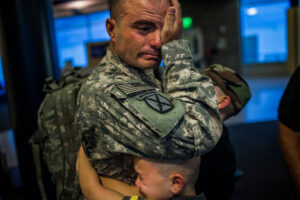
New York Times reporters Catrin Einhorn and Leslye Davis directed and produced the new documentary Father Soldier Son, a ten-year project that has landed this month on Netflix. One measure of how good it is, is how bad it hurts.
The documentary follows the Eisch family. Brian is a young single father—his wife “took different paths,” he says tactfully—and a Staff Sergeant in the 1st Battalion, 87th Infantry Regiment, 10th Mountain Division. He deploys to Afghanistan, leaving his two sons, Isaac and Joseph, with their uncle for the year. His boys are very proud of and deeply attached to their father, and as a father with two sons, it was nearly unbearable to watch Brian Eisch’s children have to deal with his departure, absence, and his severe wounding in action.
There are many skillful touches to the film, such as juxtapositions of images of the Eisch children, looking at photos of their father overseas, with a shepherd child in Afghanistan staring at a Blackhawk helicopter spinning its rotors in the dust. One recurring device is to use the characters’ own statements as foreshadowing for what will happen. Isaac Eisch, an emotionally precocious teen, worries, when Brian leaves for Afghanistan, that his father’s ebullient personality will change—which it does, of course, once he has returned home. Brian’s wounds are so severe that he eventually opts for elective amputation of a leg below the knee, in hopes of relieving the pain. He has to give up his army career and says he no longer knows who he is. At home, Brian slips into depression and/or PTSD; his live-in girlfriend complains that he spends ninety percent of his time playing combat video games and not engaging with her and their children.
But Brian eventually heals enough to get the prosthetic that will give him mobility again, even to be able to run. The family’s moods lighten. As Brian and his partner go for his first post-amputation jog on their country road, he tells his younger son to be careful where he rides his bike.
That son, Joseph, adores his father and intends to go in the army himself, possibly before graduating high school. It is startling to watch him sit in his dad’s wheelchair, playing combat video games, like his dad. “I want to run around, shootin’ guns, doing fun stuff,” he says. “Seeing all the cool stuff. Like I bet you we’ll be in a really cool war somewhere else.”
He is hit by a truck on that road where he was warned to be careful, and killed at the age of twelve. It is an unbearable loss. Brian, who identifies closely with Joseph, is crushed. Isaac, who had hopes to go to college and get a job close to family all his life (plans Brian did not support), decides to go in the army, to please his father and to fulfill his younger brother’s dream.
Early reviews of the film talk about its “sketchiness” and quiet objectivity, as if it is not delving in to the material or making its point sufficiently. But the documentary portrays an American tragedy that is as inevitable as a seed bearing its fruit, and it could not do so any more purposefully without being insensitive. The Eisches are a four-generation Army family, and Brian has not only made it his identity but also passed that expectation to his sons, who never do know what the war is about.
With Joseph gone, Brian and Isaac drift into separate lonely silences, wondering what service and Brian’s sacrifices were for. Yet they seemingly have nothing else to turn lives to. Worst of all, Brian cannot open himself to others for comfort—theirs or his. Brian hints coldly at suicide to his now-wife. “Sorry,” he says.
They have an infant son, and things seem to be going better, but there are ups and downs. She says at one point, in near-despair, “He doesn’t feel manly. He doesn’t feel masculine enough.”
Brian obviously loves his new son. Driving with the little boy in his car seat, Brian says, “One of the hard things about being a boy is being tough enough. I want my little banner-banner(?) to be a tough little shit. And I do want him to serve.” The single-mindedness of it is inevitable and chilling.
Politics are never mentioned in the film, but well-meaning people who cannot understand why small-town and rural White men seem to be in despair about identity and tradition, and why they have such an investment in a certain kind of masculinity, would do well to watch.
